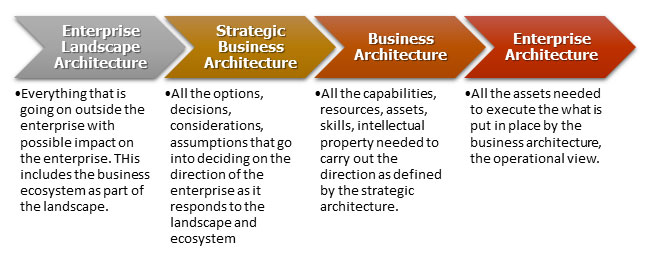
Business and IT Architecture (1)
With the emphasis today on restructure, divestiture, consolidation and merger it has become important to understand the structure of the enterprise through the relationship of all its components. The implies that there is a need for an explicitly stated architecture that depicts at least on a high level these relationships. Such an architecture can have a number of artifacts such as relationship matrices that provide the material for doing impact assessment as well as identifying opportunities for defining platforms (shared processes for shared support) and consolidation of processes (standardization), systems (understanding overlaps), databases, locations, documents and other components of the enterprise. Matched with an architecture for the digitized part of the enterprise represented by IT an enterprise is positioned to take advantage of new and improved applications of technology, skills improvement, work flow and performance management tools that are currently available. KCI support this by providing service for:
- Business architecture
- IT architecture
- Product architecture
- Functional architecture
Successfully Responding to Change
Business and Enterprise architecture are the hot topics today. Enterprise architecture dealing with the IT infrastructure and its relationship to the business and Business architecture dealing with the structure of the business and its alignment with the digitization of the business including IT. However, the architecture framework encompasses a broader scope starting with the business environment defined by the business landscape and ecosystem to the detailed execution of the business to respond to that environment. A more complete picture of the architecture and their relationships is shown below:
Organizations are faced with high-demand response to changing business conditions in their environment. The interoperability of organizational components depends on how well the business architecture is known, documented and analysed with various types of business analytics. In the past, this depended on the corporate knowledge in people’s heads. The economic situation today has pressured organizations to merge operations, consolidate, divest and re-arrange their basic components. Loss of staff also means loss of knowledge of how the organization works. Assessing impact of changes depends on the preparation of models used to describe the organization and the analytics available to conduct an assessment of changes.
Enterprise (IT) architecture is perhaps the most common architecture developed today. The reasons for this are simple. Many of the architecture techniques have been developed by IT to cope with the explosive growth of the use of digital technology, the large cost of digitization, the complicated structure of enterprises and the rapidly changing structures that are needed to respond to market changes and economic impacts.
The business and IT architectures must be linked and understood to manage business change and address the demands of contemporary business. Businesses today are required to develop their architecture skills and capabilities to successfully respond to the changes in their environments.
- Architecture Resources
- Architecture Professional Education

